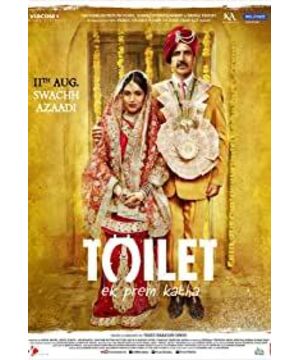From last year's "Wrestling! Beginning with "Dad", almost all Indian films introduced into domestic cinemas have created a double myth of box office and word-of-mouth, which amazes Chinese filmmakers and movie audiences. What is commendable is that we have noticed that these popular Indian films are often responses and reflections on the current social problems in India.
Recently, another Indian film, "Toilet Hero", has been introduced into China and is being shown in theaters. It reflects the real problem of Indian women's difficulty in going to the toilet. The film is adapted from real news events in India. An Indian woman who grew up in a Western-style family with a higher education, married a bicycle shop owner in an Indian village, but after marriage she found that women could not use the indoor toilet and had to go to the outskirts of the village in the middle of the night or early in the morning. Open defecation is related to the social, cultural and religious background of India. Many places believe that building toilets indoors is a bad sign, full of filth and disrespect to the gods.
The problem caused by open defecation is not only in the level of hygiene, in addition to making the living environment a mess, there is also a serious security threat. According to relevant statistics, 50% of rape and violent crimes in India occur when women go to the toilet in the suburbs. In 2014, there was a brutal incident in which a pair of cousins were raped, killed and hung on a tree while they were going to the toilet in the suburbs.
Why have feminist-themed films erupted in large numbers in India in the past two years? Does this come from the superb and profound introspection ability of the Indian people? What impact did these films have on the reality of India? Taking the opportunity of the release of "Toilet Hero", we interviewed the film's creators and chatted with them about filmmaking and women's survival in India. Through this film, we saw that it tells more than just a story about toilets , even not just about women, but about how to defy ingrained ideas and defend justice and justice.
Written | Beijing News reporter Zhang Ting
How difficult is it to use the toilet indoors?
The toilet revolution in a movie
In recent years, almost every Indian film imported into China can create a double myth of box office and word of mouth. Last May, the movie "Wrestle!" starring the famous Indian actor Aamir Khan. "Dad" brings real inspirational stories to the big screen. The film describes the history of a passionate female wrestling champion. Many audiences gave it the title of "Most Feminine" in 2017. Afterwards, "Mysterious Superstar", "Little Lolita's Uncle Monkey God", "Starting Line", "Baahubali King", and then "Toilet Hero" which is being shown, and "Toilet Hero" which will be launched in domestic theaters in September Pad Man", Indian movies seem to be hanging all the way, especially in the theme of women's movies, their performance is particularly dazzling.
As the name suggests, "Toilet Hero" is a story about a struggle with toilets. In India, where there is a custom of open-air toileting, the new daughter-in-law Jaye (Bumi Pedekar) is married to a village without toilets. She must go to the open-air toilet with the women in the village late at night every day. Jaye is a modern, highly educated woman who grew up in an intellectual family that values gender equality, and she cannot accept that women must go to the toilet in the wild. Facing the toilet problem, Jaye's husband Keshav (played by Akshay Kumar) racked his brains, rubbing other people's toilets, rubbing train toilets, and even desperately stealing public toilets. It's hard to get a toilet. To this end, the new daughter-in-law did not hesitate to propose "divorce without a toilet"... The struggle between Jaye and her husband Keshav gradually shook the ingrained bad habits in the village, which not only caused unprecedented local repercussions, but even set off a revolution in women's toileting throughout India.
In India, it is not a natural thing to go to the indoor toilet. On the contrary, more Indians are used to solving the problem of excretion in open spaces. Especially in rural India, open defecation can still be seen everywhere. According to statistics, about 600 million people in India do not use indoor toilets, but choose to solve the problem of defecation in bushes, fields or roadsides. This means that for every 100 hectares of land in India, more than 200 people defecate in the open. Since 2014, the Prime Minister of India has launched a "toilet revolution", and the government has allocated a large amount of money to build indoor toilets. However, due to religious and traditional reasons, open defecation is still deeply rooted. From this, it is conceivable that "Toilet Hero" faces huge obstacles from conservative forces.
But the outcome of the "fight" is reassuring. The film received 40 million likes when it was released in India last year, and the high level of discussion made it the annual topic of Indian films, and successfully ranked among the top ten domestic box office in 2017. The Indian Prime Minister recommended the film on social media and affirmed its value concept; at the end of 2017, Bill Gates listed "Toilet Hero" as the "Top Ten Inspirational Movies" of the year. After the film was released, the phenomenon of going to the toilet in the wild in India has been greatly improved. According to the statistics of the filmmaker, the proportion of promoting going to the toilet in the wild in India has dropped from 60% to 30%, which can be said to have improved the toileting situation of nearly 600 million Indian women. Behind the film's high popularity and high box office, it is naturally closely related to the toilet problem in Indian society.
Because of the pain, I am more alert
The Interaction of Social Events and Filmmaking
At the recently concluded Beijing International Film Festival, "Toilet Hero" participated in the film festival screening. In the post-screening communication session, a Chinese audience said excitedly, "As a Chinese audience, I admire Indian filmmakers' attention and ability to reflect on realistic themes. There are also many inequalities faced by Chinese women, but they are rarely seen. Domestic films with the same reflective strength have appeared." The audience's emotion may represent the thoughts of a considerable number of Chinese audiences, and such comparisons often occupy a prominent position in the relevant reports and comments of "Toilet Hero".
So, in just a few years, is it possible to make many excellent feminist films reflecting on the living conditions of women, thanks to the inherent and high-quality reflection ability of the Indian people? In the interview, one of the film's creators and producer Pandi doesn't seem to think so. He sees the mass-produced female-themed films in recent years more as a reflection on social events in India in recent years. respond. According to Pandy's analysis, these incidents have made people in them have to start thinking about what is wrong with our attitude towards women. After every social incident, everyone on the Internet, in the media, and in various discussion spaces will be very concerned about the incident. With adequate discussions, these discussions naturally lead to reflection - these films are the condensation of social reflection.
In other words, when it comes to women, India is a country that has really suffered. And these pains have made Indians more vigilant in their treatment of women. On December 16, 2012, a bus gang rape case shocked the world in Delhi, India. KJyoti Singh, a 23-year-old Indian girl and a medical intern, was gang-raped and beaten by five male passengers on the bus. Singh, who was dying, was thrown on the side of the road. Singh was sent to the hospital for full rescue, but she was seriously injured. 13 days later Died in Singapore. Four adult defendants were sentenced to death, and a film crew later spent two years filming a documentary about the case, "India's Daughter," interviewing one of the rapists, Mukesh Singh, his lawyer and the victim's parents. The rapist claimed in the documentary that when a woman is raped, she should keep silent and not fight against the rapist, so that she will not die, and even bluntly said, "When a rape happens, women should be more responsible than men. main responsibility". His remarks shocked the world and angered the Indian people. A wave of protests broke out in India. Tens of thousands of demonstrators, mainly young students, held anti-rape and anti-sexual violence demonstrations.
The pain caused by the toilet problem is far more than the hygiene level, and there are also various types of sexual violence crimes and security threats.
These traumas shared by the whole society will not just go away with the wind, but will inevitably affect future creations and reflections. "Such incidents of sexual violence are emerging in an endless stream, but there is no doubt that the bus gang rape case in 2012 had a huge impact." Pandey observed that a large number of female-themed films in India in recent years have gradually moved from 2013. climax.
In addition to the influence of social events, the boost of capital is also another powerful force. "Toilet Hero" was adapted from a real event. In reality, this story was on the news and caused a great sensation. The producer just took a fancy to the sensational effect of this story and thought it was contagious, and decided to shoot this movie. . With "Wrestling! The "Paving the Way" pioneers led by films such as "Dad" have achieved both box office and word-of-mouth success in female film themes, naturally providing a boost to the same type of female films, prompting the planning and production of more films with the same theme. The main creator of "Toilet Hero" also admitted that the explosion of Indian female-themed films certainly helped the release and release of the film, and even the box office was "much better than we expected".
In the past few years, we have often lamented that in the domestic film and television market, the blindness and hasty of capital has led to a large number of bad films. But in another situation, we can see that if the boost of capital can lead to the emergence of more realistic and reflective films, then the power of capital can also produce more benign interactions and effects.
Dialogue with the creator of "Toilet Hero"
"The whole world is gaining more and more consensus on values"
Beijing News: We know that "Toilet Hero" is based on real events. What elements made you decide to adapt this event into a movie? What was the biggest difficulty in the adaptation process?
Shri Narayan Sim (director of "Toilet Hero"): At the beginning, the screenwriter actually brought 3 scripts, one of which was this story about toilets. I learned that it was based on a real event, and it was a big hit in the newspapers. Most importantly, my hometown is in the countryside, and I have also encountered such a problem. I know that this problem exists in large numbers in the countryside, so I made this story (it will resonate). The movie is not much different from the real story. Of course, for the effect of the movie, we added some dramatic clips, such as the scene of stealing the public toilet.
Niraje Pandey (Producer of "Toilet Hero") : The most difficult thing is the difference in people's concept. As said in the movie, building an indoor toilet is traditionally considered unlucky. Many people think that Open defecation is born in nature and belongs to nature. These concepts are deeply rooted and have a religious background. It is indeed a very stubborn challenge. In addition, we are actually a little worried about how to present the topic of "toilet", and worry that it will make the audience feel uncomfortable, so how to raise this question and grasp the scale is also very important. The end result was actually better than we expected.
Beijing News: There is a scene in the movie where villagers meet to discuss the controversy between open defecation and indoor toilets. The villagers mention the religious background of open defecation. How do you think about the relationship between the toilet issue in India and the religious background?
Siddhart (screenwriter of "Toilet Hero") : The film quoted the content of the "Vedas", which mentioned that people should be close to nature, born in nature and return to nature, but there is no original text for people to defecate in the open, take Using religion as a reason is actually a misreading of religious scriptures and Indian traditions.
Beijing News: In the movie, some villagers used indoor toilets as an example to criticize India for being too influenced by "Western values" in recent years. I think we can all agree on the toilet issue. It not only brings hygiene problems, but also various security threats. But aside from the issue of toilets, in a broader sense, do you think there is a tendency for Indian society to be too influenced by "Western values"?
Siddharth (screenwriter of "Toilet Hero") : We used to be under British colonial rule. English is an important language in Indian social interaction. Of course, you can say that we have been influenced a lot by Western values, and even impacted native Indian values. . But more often, what I see is not Western values or Eastern values, Indian values, but human values. For example, to be kind to others, to be clean and tidy, these are the common requirements of human nature.
Grema (screenwriter of "Toilet Hero") : Let me try to answer your question from another level. What you may want to ask is some more macro-level thinking? What I want to say about this is that values are actually always in conflict. In the final analysis, it is everyone's choice for this conflict. When faced with the conflict between the old and the new, some people choose to accept the new value, and some people chase the old value. And we believe that choices must be made. In "Toilet Hero", we have made choices that must be made, even if it challenges certain traditions and concepts.
Beijing News: We have noticed that, on the one hand, India has done very little in terms of women’s safety and gender equality. Rape cases and related violent crimes are emerging one after another, and women face various survival difficulties in society; On the one hand, as we have seen, India is also intensively producing a large number of feminist-themed films, and India has had its first female prime minister, Indira Gandhi, very early. Do you think there is a huge polarization in the situation of women in India?
Niraje Pandey (Producer of "Toilet Hero") : The phenomenon you are talking about does exist, in India's big cities, women and men have the same excellent performance in the workplace, there is not much difference; but in India In rural and many remote areas, the situation of many women is still far from that of men. Violent cases that have occurred in recent years have also made us think more deeply about this. But on the other hand, there is a similar situation in many countries, that is, there is a big gap in the status of women in different regions. In India, in addition to the issue of women, there are other issues such as caste system and class injustice. The United States and China also have their own problems. The important thing is to face your own problems.
Beijing News: What do you think of the explosion of feminist films in India in recent years? How does it interact with social events?
Nirajit Pandey (Producer of "Toilet Hero") : There has been a lot of women's films in India in recent years, but it is difficult for me to trace exactly when it started. If you must find a relatively specific time, I think this trend started in 2013. A large number of social events have promoted people's reflection on the situation of women in Indian society, and the filming of the film has in turn affected the situation of women in society. This is an interaction, and a good interaction.
Siddharth (screenwriter of "Toilet Hero") : In fact, India has always had a lot of female-themed films, the earliest can be traced back to "Indian Mother", which was nominated for an Oscar for best foreign language film in 1957. But in recent years, among various factors, I think one factor has been overlooked, that is, the huge role of the Internet. The popularity of the Internet has allowed the world to communicate with each other, and we can all see how people in other countries live. As a result, we have reached consensus around the world on more issues. Technological changes have brought us into contact with the world. For example, 20 years ago, it might have been hard for me to imagine that I could work in the same room with Grema (another female screenwriter of "Toilet Hero"), but now it is very common, and As elsewhere, we work together as a friendly equal.
The Beijing News: What is your impression of Chinese films? Do you have any favorite directors and Chinese filmmakers who are looking forward to cooperating?
Nirajit Pandey (Producer of "Toilet Hero") : If the Chinese filmmaker who is most looking forward to cooperating should be Jackie Chan. I have seen many works of Wong Kar-wai, and I like them very much. In addition, I have also seen Zhang Yimou's "Hero", which is also very impressive.
This article is exclusive original content. Written by: Zhang Ting, reporter from Beijing News; Editor: Let's go. It may not be reproduced without the written authorization of the Beijing News, and you are welcome to forward it to the circle of friends.
View more about Toilet: A Love Story reviews











